PUBLICA INFERIOR: A Republic of Etruria AAR
- Thread starter inertiatic
- Start date
-
We have updated our Community Code of Conduct. Please read through the new rules for the forum that are an integral part of Paradox Interactive’s User Agreement.
You are using an out of date browser. It may not display this or other websites correctly.
You should upgrade or use an alternative browser.
You should upgrade or use an alternative browser.
Chapter 7
The Fall of Rome
The Fall of Rome
JANUARY 284 BC.
The Etruscan Senate gathers in the wake of the epic victory over Carthage.
Consul Martialis delivers the glorious news to the Senate House. There is much rejoicing and disbelief at the defeat of mighty Carthage and the annexation of Corsica. Much of this was thanks to the shrewd political acumen of Martialis himself, a brilliant statesman who had the foresight 15 years earlier to shape lasting alliances with the Greek world. Aside from the desertion of Egypt towards the end of the war, the alliance had held strong and allowed Etruria to conquer it’s first overseas possession at very little cost in manpower.
Etruria had thus been lifted to ever-greater heights of power and glory. But even as the Republic took each bold step forwards and gained new conquests, it was increasingly fragmenting from within. This would be the final time that the Senate House would be gathered with such a sense of unity and purpose. This was the Senate’s high-water mark. Everything that followed would ultimately lead to its ruin.
-------------------------------------------------------------------------------------------------------------------------------------------------------------------------
Only a few months after the end of the Punic War, Consul Martialis called for a second assembly of the Senate. Proconsuls Valens, Gracchus and the other members of the populist faction Pax Etruria were keen to use this congress as an opportunity to press for a focus on the rapid integration of Corsica into the Etruscan cultural sphere. This would take many years of effort and investment but would ensure that the island remained a loyal province of the Republic for generations to come. Valens and Gracchus would also lobby for a refocus on colonisation beyond the Republic’s current northern boundaries – this was a crucial tenant of Pax Etruria’s policy and one which had been sorely neglected in recent years.
Yet the expansionist faction of Mars Imperito, of which Martialis was a leading member, had other ideas. Having orchestrated the conquest of Umbria, Sabini and Corsica in recent years, Mars Imperito had dazzled the Senate and was showing no signs of abating its hunger for further conquests. Valens, Gracchus and their other supporters were therefore aghast when Martialis brought a new motion to the floor. He proposed nothing less than the immediate and complete annexation of the neighbouring Kingdom of Picentis.

The hawks of Mars Imperito had long coveted the remainder of King Domitius’s realm, held under tributary status since Picentis had been defeated at the end of the First Italian War. The Picenti lands constituted only a single province – Picenum - on Italy’s eastern coast, yet this contained the great city of Ancona and it’s conquest would further swell the Republic’s manpower reserves for future campaigns. Perhaps most importantly of all – the ancient borders of the Etruscan Golden Age were finally within reach. Following the reconquest of Corsica, only Picenum and Rome remained beyond the widest ever reaches of Etruria’s dominion.
Nevertheless, Valens knew that another war so soon would be deeply unpopular with the Etruscan people – a large proportion of the masses craved peace and stability after so many wars in recent times, and consequently he fought hard to block the motion. But it all came to no use. With Martialis holding the Consulship, the combined supporters of Mars Imperito were able to cancel the Picenti tribute on 4th April, with the declaration of war finally being given on 16th June, less than 6 months following the end of the Punic War.

When the news was announced to the populace, riots broke out in the capital and public disorder had to be subdued by the auxiliary garrison. Meanwhile, Valens and other Pax Etruria Senators were left fuming. They now realised that they would have to resort to increasingly drastic methods to reign in the reckless warmongering of their political opponents in Mars Imperito.
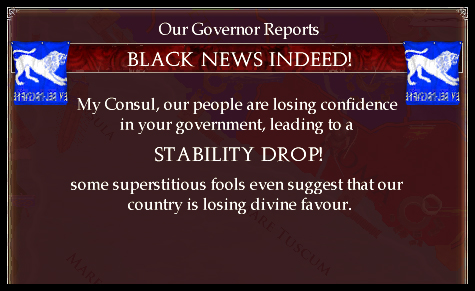
Stability drops as the Republic's citizens despair at yet another war being declared.
Nonetheless, the orders were dispatched to Mercator Audax at the head of the Auxilia Etruria: march on Picentis, destroy the army of King Domitius and conquer the great city of Ancona.
Thus began the Second Italian War.
-------------------------------------------------------------------------------------------------------------------------------------------------------------------------
STRATEGIC SITUATION: JUNE 284 BC
King Domitius had long feared the day when Etruria would return to claim the last of his realm. In the years following the disastrous First Italian War (291-290BC) he had done his utmost to strengthen his forces, but having since lost the city of Perugia he could only manage to maintain a force of 9,000 men. Domitius would again lead the army himself – he remained a highly talented General, but the odds were stacked against him.
The Etruscans had recently expanded their army to a total of 14,000 men. These were hardy veterans of long years of campaigning on the northern frontier, most of whom had seen dozens of pitched battles against the ferocious barbarian tribes of Germania and Gaul. The army consisted of an elite core of well-equipped heavy infantry, supported by ranks of deadly archers. Commanding this formidable legion is the legendary Mercator Audax – saviour of the Republic and the man who has kept its citizens safe from countless barbarian incursions during the last 20 years.
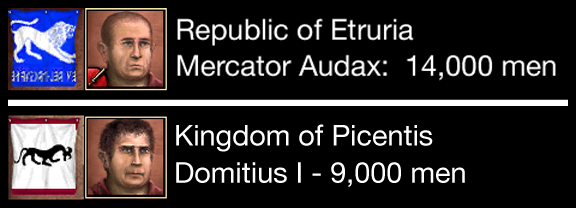
Domitius and his forces are outmatched by the Auxilia Etruria under Mercator Audax.
Nevertheless, Domitius had shown a capacity for daring and unpredictable tactical manoeuvres over the course of his long career. Once again, he defies expectation and opens the course of the war in a surprise attack.
JUNE - NOVEMBER 284 BC: DOMITIUS'S LAST STAND
Catching the Etruscans off guard, Domitius leads his troops on an immediate rapid march north, hoping to deflect the course of the war away from his homelands. On 25th July his troops enter the province of Umbria and take up a strong defensive position on high ground overlooking Perugia – the city formerly under Domitius’s control.
Arriving some days later, Mercator and the Auxilia Etruria approach the Picenti position cautiously. Several days of initial skirmishing between the two forces take place before Mercator launches a full-scale attack on 1st August. In the ensuing Battle of Umbria, the superior discipline and experience of the Etruscan heavy infantry proves decisive – the Picenti forces are driven from the high ground and pushed south back towards their home province of Picenum.

The first battle of the war commences in Umbria - formerly a province under Domitius's Kingdom...

...but Domitius is unable to withstand the Etruscan assault and is sorely defeated.
Mercator wastes no time in ordering an immediate pursuit. By 6th November he had cornered the remains of Domitius’s army near Ancona and, despite Domitius’s best efforts, his forces are completely annihilated in the disastrous Second Battle of Ancona. Domitius himself manages to escape and is last seen riding hard towards the city of Rome. Meanwhile, the victorious Mercator lays Ancona under siege.

Mercator lays Ancona to siege following the destruction of the Picenti field army.
-------------------------------------------------------------------------------------------------------------------------------------------------------------------------
NOVEMBER 284 - FEBRUARY 283 BC: TROUBLE IN THE SENATE HOUSE
Meanwhile, back in the Senate House, factional in-fighting has once again flared up which threatens to overshadow the more positive news coming from the front lines.
With Consul Martialis’s term coming to an end, an embassy had arrived at the Senate House from his allies in neighbouring Massilia. The Greek Republic’s territory had suffered greatly at the hands of barbarian raiders in the years since Etruria had recovered from it’s own Great Crisis. Across Massilia, lands had been ravaged and resources were scarce. Now they sent a fraught delegation to the Etruscan Senate, requesting financial assistance in order to rebuild and stabilise their settlements. Martialis is keen to lend aid to his old allies, conscious that Massilia is Etruria’s primary link to the powerful Alexandrian League of Greek states. Valens, however, sees his chance to take the initiative and ridicules Martialis in the Senate House, citing Massilia’s shameful lack of support during the First Italian War and the dangers of being associated with such a volatile and unpredictable network of Greek states. To Martialis’s frustration, Valens coaxes enough support in the Senate to have the proposal rejected – the Massilians would go home empty handed. This would mark the start of a bitter and personal rivalry between Martialis and Valens, as well as the decline of Etruscan relations with Massilia itself.

Relations with Massilia are damaged by the Etruria's refusal to assist them in their time of need.
By January the following year, the tension continues to build up during the new Consular elections. Thankfully the bitter impasse that dominated the previous elections are avoided and, with Mercator’s powers as Censor now balanced by that of his opposite number Ocvavius, a middle ground is tenuously reached. One of the few remaining independent Senators, Marcus Mamilus Varus, is consequently declared Consul for 283 BC. Varus has managed to maintain a respectable career in the Senate without declaring loyalty to either Pax Etruria or Mars Imperito – quite a feat in itself, given the current political environment overshadowing the Republic.
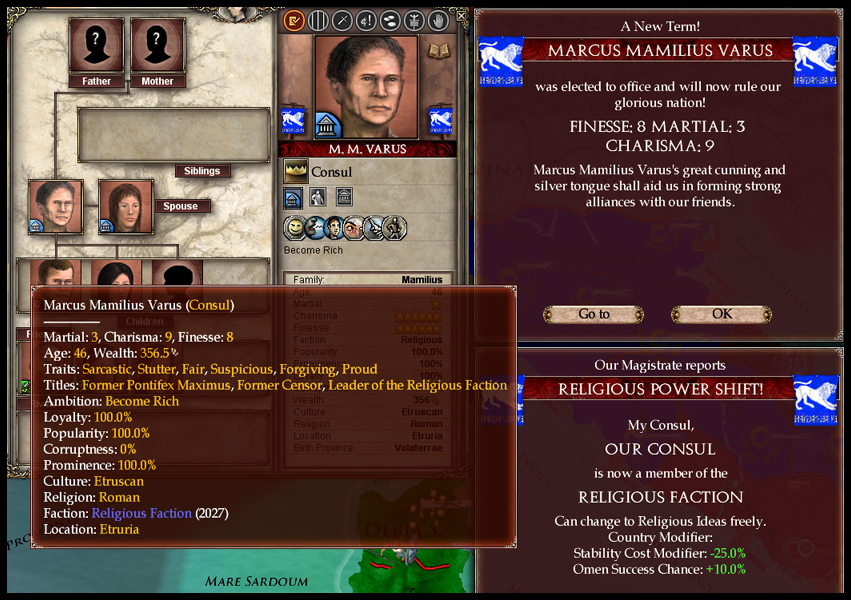
The new Consul Varus is one of the few remaining independent Senators.
Varus’s first act as Consul is to negotiate the surrender of the remaining Picenti forces in Ancona, who finally submit on 3rd February. Proconsul Martialis is heavily involved in negotiating the terms of the war he had begun – Picentis is to forgo all political independence and would henceforth become a province of the Republic of Etruria. An Etruscan garrison is installed in Ancona to ensure the city’s loyalty. The Republic was victorious once more, and the Kingdom of Picentis had finally been eradicated.
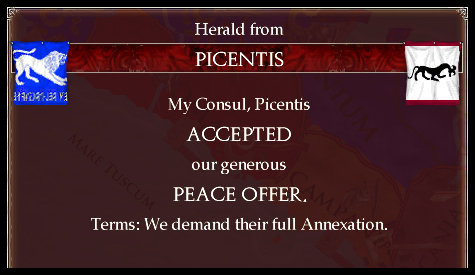
The Kingdom of Picentis finally surrenders...

...it's remaining lands become incorporated into an expanded Republic of Etruria.
The Kingdom of Picentis had been one of the foremost opponents of the Republic at the onset of the Second Samnite War. As it’s fortunes wavered in tandem with the Etruscan rise to supremacy, it crowned it’s legendary General, Domitius, as King in a desperate attempt to halt it’s slide into obscurity, but not even the formidable Domitius could withhold the momentum of Etruria and it’s allies in Italy. Domitius himself is believed to have been granted asylum by his old ally, Rome, which now stands terribly alone and vulnerable.
-------------------------------------------------------------------------------------------------------------------------------------------------------------------------
MARCH 283 - AUGUST 282 BC: THE CONQUEST OF ROME
Back in Etruria’s Senate House, news of the surrender of Picentis raises the mood of the war party to fever pitch. Following two largely bloodless and highly successful wars against firstly Carthage and then Picentis, the supporters of Mars Imperito immediately call for yet another conquest – that of ancient Rome itself. The conquest of Rome would remove Etruria’s final obstacle to complete control over northern Italy, while the Roman grant of asylum to Domitius provided the Republic with a ready made casus belli. With any voices of dissent drowned beneath the fervour of the pro-war party, plans are drawn up for the final conquest of the Republic’s old nemesis.

Mars Imperito supporters immediately clamour for further conquests.
The campaign is put on hold while Mercator Audax leads the Auxilia to victory over the latest great horde of barbarians to cross the Alps. He then marches on Rome in the new year.
By now, the once great city of Rome is a shadow of it’s former self. The Sack of 307 BC had broken the spirit as well as the infrastructure of the Romans, who had ever since failed to raise any kind of significant army or make any notable inroads to recovering their once dominant position over it’s neighbours. As Mercator approaches, the best that the Romans can assemble in defence of their city is a paltry 5,000 men, which Mercator easily smashes on 18th April. Little further resistance was to be found from within the city, which quickly surrenders.

Mercator lays Rome to siege...

...the demoralised Roman defenders surrender soon after.
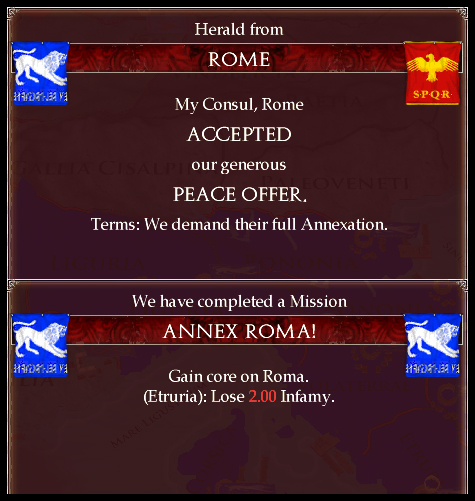
Rome had been conquered. The Second Italian War was now over.
-------------------------------------------------------------------------------------------------------------------------------------------------------------------------
SUMMARY - AUGUST 282 BC - THE GOLDEN AGE BORDERS RECLAIMED
News of Rome’s annexation causes jubilation in Tarquinia. Not only had the war ended quickly and painlessly – more importantly, Etruria had finally reclaimed the ancient borders of its golden age. A new dawn had arisen. No longer would the Republic be faced by enemies within Italy – aside from neutral Magna Graecia, only it’s trusted allies the Samnites and the Lucani remained on it’s southern borders. The vast city of Rome was finally conquered and it’s huge population, along with that of Perugia and Ancona, would form a pool of manpower that would help sustain the Etruscan Auxilia in future campaigns. As for Domitius, his whereabouts remain unknown, presumably having escaped before the siege closed in.
Eager to make new political allies, Consul Varus gives favourable terms to the leading Roman politicians, some of which are even inducted to the Etruscan Senate House despite the protests of hard line Etruscans such as Martialis and Nasica. Among the foremost of these Romans is Publius Cornelius Dolabella, a former Roman Censor who possesses fabulous personal wealth as well as great influence in the city.

Dolabella, a powerful Roman magnate, is made a Senator in the Republic of Etruria.
General Mercator, meanwhile, was now at the very height of his fame. Under his faultless guidance the Republic's military had outridden several successive wars while maintaining a strong frontier against the regular barbarian incursions from the north. He was now revered in every corner of the Republic. It was around this time that he began to covet a second rise to the Consulship, to have the honour of leading Etruria in this new and exciting age beyond the limits of it's ancient glories.

Mercator Audax sets his sights on a second Consulship.
At the end of 282 BC Varus would exit the Senate House well satisfied following a successful spell as Consul. But the fantastical conquests of the last few years disguised the ever increasing rot taking hold within the Etruscan Senate House. Every success in recent times had only brought greater internal conflict between the Republic's ambitious political factions, as well as the Senators who led them in ever more ruthless tactics against their opponents. The rejection of the Massilian delegation in 284 BC, and the bitter rivalry that had subsequently emerged between Proconsuls Martialis and Valens, would in hindsight be seen as one of the key milestones on the downward spiral that lay ahead. Valens had by now come to realise that drastic measures were necessary if Pax Etruria was to reign in the reckless warmongering of it's adversaries in the Senate House.
For now, though, the citizens of the Republic basked in victory. Etruria had solidified it's domination of northern Italy and, with the borders of it's Golden Age restored, seemed ready to face whatever challenges lay ahead.

The Republic of Etruria with it's Golden Age borders restored [yellow border added between Etruria and the Samnites].
Last edited:
1 - Great job on getting the Golden Age borders!
2- Question - What patch do I use with Magna Terra?
2- Question - What patch do I use with Magna Terra?
1 - Great job on getting the Golden Age borders!
2- Question - What patch do I use with Magna Terra?
1 - Thanks DKM! Now to see if we can expand further...
2 - The Magna Terra download thread is here. I believe the latest version works with 2.32b, though because I started this AAR years ago I'm using an old version.
You got to admire how long the historical Roman Republic remained a working institution. Compared to them the Etruscan Republic is already faltering after only 30 years of Inertitatic enlightened rule  . They haven't even become the dominant Mediterranean power yet! At least the Roman had the good sense to overshadow all their credible rivals before turning in on themselves.
. They haven't even become the dominant Mediterranean power yet! At least the Roman had the good sense to overshadow all their credible rivals before turning in on themselves.
Will Mercator be the Etruscan Caesar? Or more likely its Sulla?
Will Mercator be the Etruscan Caesar? Or more likely its Sulla?
- 2
You got to admire how long the historical Roman Republic remained a working institution. Compared to them the Etruscan Republic is already faltering after only 30 years of Inertitatic enlightened rule. They haven't even become the dominant Mediterranean power yet! At least the Roman had the good sense to overshadow all their credible rivals before turning in on themselves.
Haha, very true! We've skipped world domination and gone straight to the self-destructive court intrigue
In fairness I've been playing the game roleplay-style, while the game-generated events have thrown up some interesting random twists. But you're right - actually it's more like a Greek history than a Roman one. Athens/Sparta etc, building up regional hegemony only to watch it collapse in on itself a generation later...
Will Mercator be the Etruscan Caesar? Or more likely its Sulla?
Interesting analysis
As it happens, Mercator will feature heavily in the next chapter. Let's just say it's a story of ups and downs.......
Chapter 8
A Legend's Demise
A Legend's Demise
JANUARY 281 BC.
In the aftermath of the frenetic conquests of Perugia and Rome, Mercator Audax is ushered in to his second term as Consul.
By now an old man of 66, the celebrated General had only recently returned from front line duty after commanding the Etruscan forces to final victory against the remnants of its age-old Italian enemies. His sole remaining ambition was to ascend the Consulship one last time. With the weight of the army behind him and his hero-status amongst the masses secured, opposition is scarce as he easily wins the new elections.
Now he would face a new challenge – to lead the Republic into a new era, with it’s territories larger than they ever had been before, but beset on all sides by internal opposition and Senatorial in-fighting.

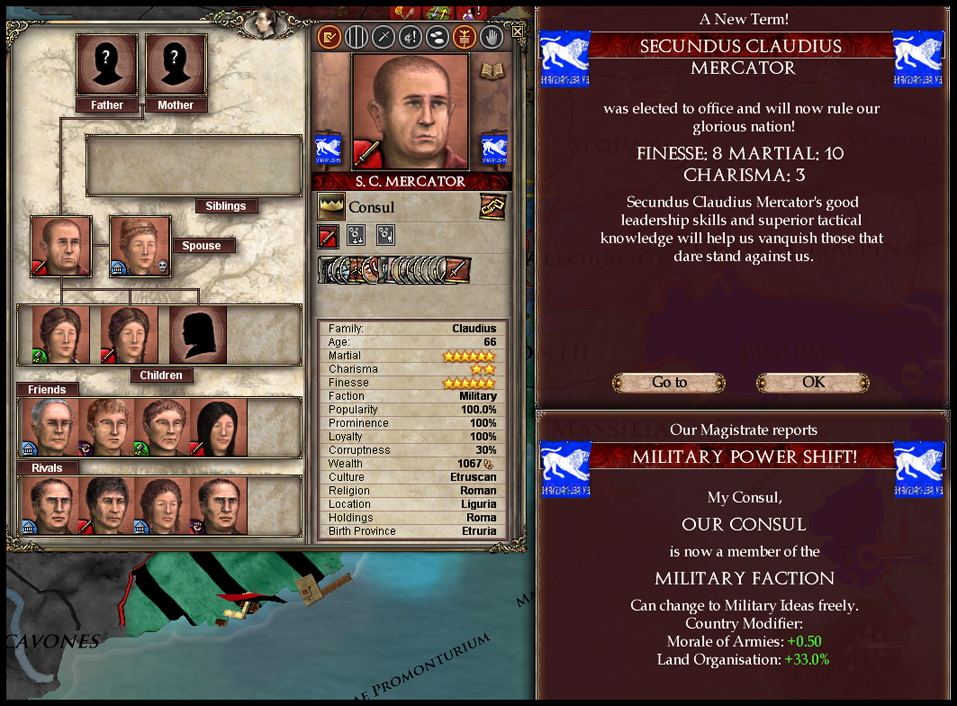
Mercator Audax achieves his goal of ascending to the Consul's chair once again.
But nobody in the Senate House, not even his closest political allies, knew that the great General was carrying a terrible affliction. For over 20 years, Mercator had been at the forefront of the Republic’s military operations. He had witnessed countless front-line horrors and experienced the myriad carnage of war upon war. The long years of campaigning had taken its toll, not only on his mental wellbeing but had also on his legacy – he had borne no sons with which to carry on his great name. Together these factors had weighed heavily on the old man for some time, but would become a decidedly more severe affliction once he had again taken on the additional burden of the Consulship.
Warning signs of what was to come could be seen early on. Within weeks of ascending the Consul’s chair, Mercator became noticeably withdrawn and disconsolate. Many Senators were shocked at this shadow of the man who had returned from the front lines. Mercator was not his usual industrious self – he was passive and lethargic, delegating much of his responsibilities and enacting few noticeable policies.
By early the following year, his symptoms became far more severe until the point came where he would barely step foot from the Consul’s chambers. He slept restlessly, waking from nightmares of destruction wrought during his time with the Auxilia. By day he brooded in shadows, delivering saturnine monologues on how there was nothing left for him in life but a slow and terminal decline. Soon his depression would overcome him entirely. In the early hours of April 10th 280 BC, the Consul drank a vial of poison and was found dead later that morning, having taken his own life.


Mercator Audax, the great hero of the Republic, lay dead.
-------------------------------------------------------------------------------------------------------------------------------------------------------------------------
Secundus Claudius Mercator Audax was the greatest General the Republic had ever had. Over the course of his long and illustrious career he had amounted numerous heroic accomplishments in service to his country – ending the Great Crisis and driving back the savage invaders, conquering Rome and Picentis, not to mention the countless barbarian hordes that he had defeated in the intervening years.
The Consul’s suicide caused shockwaves that were felt across the entire Republic. Throughout the land, Etruscan citizens mourned in the streets, lamenting the passing of their champion who had brought such glory upon the once humble Etruscan civilisation. Meanwhile, the various factions of the Senate House reacted more warily as each tried to evaluate the various consequences and ramifications.
Mercator’s death had come as a complete astonishment and left a dangerous power vacuum at the head of the Republic’s government. The leadership of the Mars Imperito faction would tacitly fall to Proconsuls Nasica and Martialis, but the extent to which they would cooperate without Mercator remained to be seen. Any remaining boundaries to the political aspirations of Nasica, in particular, were now removed. From this moment on, his former protégée’s ambition and ruthlessness would play an increasingly dominant role in his actions.
Of more pressing and immediate concern were the Consulship and the Army, both of which had been under Mercator’s direct control at the time of his death.
The issue of the vacant Consulship was resolved quickly, but not without significant dissent. While Nasica and Martialis dithered following the terrible news, it was Octavius who reacted the quickest. The former General had recently been installed as Censor by Nasica himself, in order to placate opposition to Nasica’s involvement in the Punic War [see Chapter 6]. Octavius now exercised his powers in the same way that Mercator had done back in 287 BC and installs none other than Spurius Vitellius Valens, the leader of Pax Etruria, as the Republic’s new Consul.

Valens steps into the vacant Consul's chair.
Valens gleefully took the Consul’s chair within days of Mercator’s passing. It was to be a historic third term in office. His first term as Consul, almost 30 years ago, saw the negotiation of a soft peace to end the Second Samnite War. His second term, 15 years later, oversaw a much-needed period of consolidation in the aftermath of the Great Crisis. More recently he had been frustrated by the rise of Mars Imperito and the unofficial triumvirate of Mercator, Nasica and Martialis, who had together led the Republic into a series of dangerous conflicts. These events had culminated in an increasingly bitter rivalry, particularly with Martialis who had long been the principal adversary to Valens in the Senate House.
The members of Pax Etruria had since realised that in order to compete with their warmongering opponents, they would have to resort to increasingly drastic measures. Valens' arbitrary instalment as Consul was just the first step along a dark and ominous road ahead.
Valens’s new term started encouragingly enough. His first act as Consul was to come to terms with the ambitious Nasica. A deal was quickly made between the two nominal rivals, on the understanding that Nasica would not oppose Valens’s authority as new Consul, while in return Nasica would be given Mercator’s place at the head of the Auxilia Etruria. Valens even made a separate deal with his rival Martialis, agreeing to fund and expansion of the fleet from 100 to 200 ships, while consenting to leave this force under Martialis’s independent control. It seemed as though the great statesmen of the Republic were finally starting to work together.
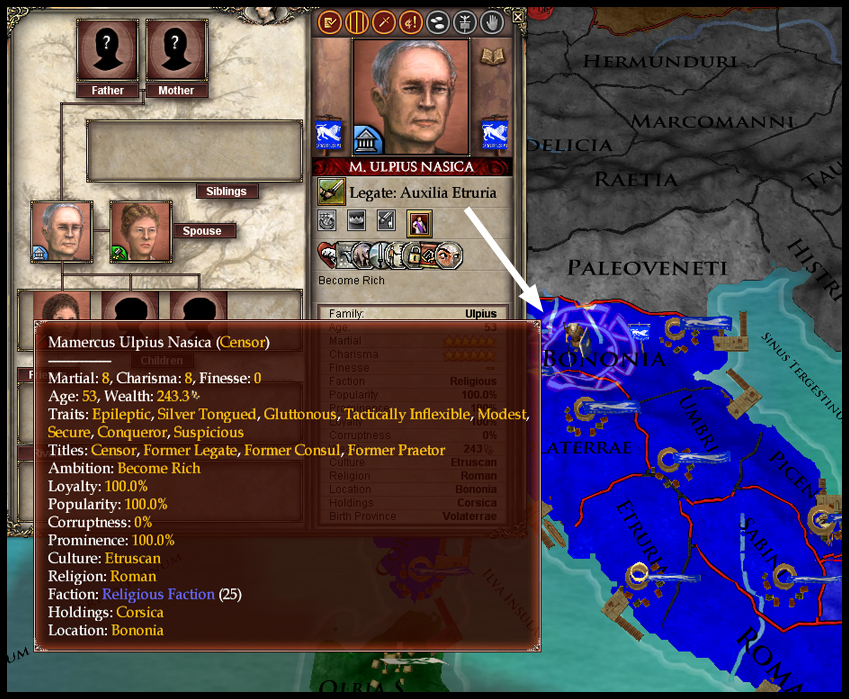
Valens makes deals to secure his term as Consul - promoting Nasica as new General of the Auxilia Etruria.
However, the balance of power in the Republic remained precarious at best – a series of developments overseas would soon come to throw Etruria into total anarchy and chaos.
-------------------------------------------------------------------------------------------------------------------------------------------------------------------------
May 279 BC. Numidia declares war on Carthage.
Carthage has been struggling to consolidate since the end of the First Punic War, now almost 5 years ago. It lost relatively little territory in the war but the damage done to its infrastructure and resources was immense. Numidia now sees its chance to cast off the shackles of its overlord and reclaim the territory it lost in its last uprising against Carthage a generation before. Soon the Numidians are joined by the neighbouring tribes of the Garamantes, eager to take advantage of Carthage’s plight. Once again, Africa is steeped in the fires of war.

Numidia once again attempts to cast of the shackles of Carthaginian supremacy...

...and are soon joined by the Garamantes, setting the scene for a bitter war in Africa.
Meanwhile, Egypt too is engulfed in domestic conflict. A certain Perdiccas, Strategos of the Egyptian 6th Army, raises his flag in rebellion and soon around a third of the Kingdom has sided with him.
Similarly, the great Diadochi Kingdom of Asia falls into civil war around the same time.

A civil war begins in Egypt...

...shortly followed by it's neighbouring Diadochi Kingdom of Asia.
A third major conflict is also taking place far to the east, where the Hellenic world borders the myriad states of India. An Indian coalition has emerged in opposition to the expansionist Seleucid Empire, resulting in fierce fighting.
The Mediterranean is now in total uproar.
-------------------------------------------------------------------------------------------------------------------------------------------------------------------------
On 7th June, a new delegation arrives from Massilia, which has nominally sided with the Seleucids against the coalition of Indian states. The Massilians call upon the terms of their alliance with the Republic of Etruria, and request that Etruria follows Massilia’s example in showing support for the Seleucid war effort.
For Massilia, this is less a call to arms than a cunning test to gauge Etruscan loyalty. Starting as recently as 284 BC relations between Etruria and its western Greek neighbours had been in decline, largely due to the fierce in-fighting taking place within the Etruscan Senate. Proconsul Martialis, who had been responsible for building up relations with the Greek world in the first place, had lobbied hard to maintain friendly relations with Massilia but had recently faced stern opposition from Valens, who had arranged for the Senate to refuse Massilia’s plea for financial assistance at the end of 284 BC. Valens saw no reason in maintaining relations with a fragmented and beleaguered state such as Massilia, given that the Greek Republic had repeatedly failed to come to Eturia’s aid in times of war.

Massilia calls Etruria to arms, but arrives to a hostile Etruscan Senate.
With Valens now as Consul, he finds little difficulty in mobilizing the support of the reactionary elements within the Senate and the Massilian delegation are curtly rebuffed once more.

The end of the Etruscan-Massilian Alliance.
The 12-year alliance between the Republics of Etruria and Massilia was now utterly broken. A more serious consequence was that the link to the wide-ranging Alexandrian League was now also shattered. The Italian states were now on their own – no more help would be coming from the Greek world.
-------------------------------------------------------------------------------------------------------------------------------------------------------------------------
Proconsul Martialis is left fuming at Valens’s actions. Much of his career – many years of hard work – had been invested into building stable alliances with the Republic’s Greek neighbours. Now it all lay in ruins. Martialis resolved to take drastic measures and, thereafter, began plotting with Nasica to enable Etruria to retake the initiative on the international stage.
Together the influential statesmen started to sound out support in the Senate House for a new war against Carthage. Carthage had been weakened since the last Punic War and was now embroiled in a desperate conflict against its African neighbours. Martialis and Nasica claimed that this was the perfect distraction to enable Etruria to invade and conquer the island of Sardinia. Sardinia held many attractions for Mars Imperito – it was in the Republic’s regional sphere of influence, it would expand it’s borders further into the Mediterranean and would also help secure Etruscan control over Corsica. The Republic had a ready pool of available manpower and was in the process of greatly enlarging it’s naval forces. In this favorable light, the two Mars Imperito leaders were able to use their significant influence to rally numerous endorsements for the proposal in the Senate.
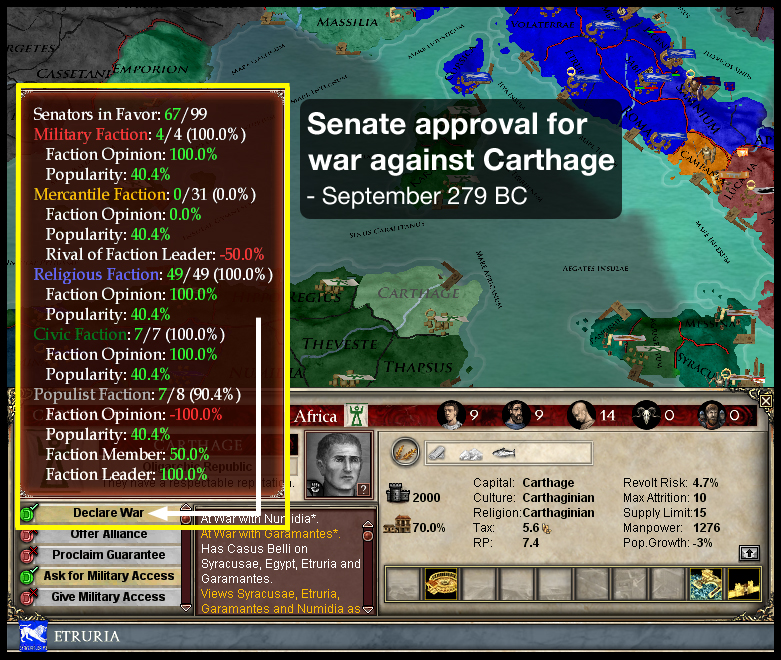
Nasica and Martialis are able to rally support for a new war against Carthage at a majority of 67 Senators versus 33 against.
Valens had been badly outmaneuvered – but he would not bow meekly to the intrigues of his bitter rival Martialis. Realising that war was now inevitable, he agrees to carry the motion on two conditions – firstly, that he is allowed to select his own envoy to deliver the message to Carthage and second, that he is given personal command of the assault force that would land on Sardinia. This was a bold and cunning gambit by Valens – a plan that, were it to succeed, would enable him to gain bitter revenge against his rivals while simultaneously building a bedrock of military support for the Pax Etruria faction, something that it had been sorely lacking until this point.
Martialis and Nasica were oblivious to the complexity of Valens’ plans and readily agreed to his terms. Neither of them could see how their actions, and that of Valens himself – indeed; all the increasingly bitter in-fighting between Mars Imperito and Pax Etruria over the long years since the Great Crisis - had led to this most dreadful and crucial turning point in the Republic’s history. Nobody could forsee the enormity of what was to come.
Thus began the Republic's final downfall.
Last edited:
One thing I hate about republics in-game is that they're always only willing to declare war on someone WAAAAYYY more powerful than you rather than someone as powerful as the republic. Anyways, so Mercator died from depression and PTSD and Nasica has tipped the political balance in their favor. I do believe you require another unifying force to save the republic.
One thing I hate about republics in-game is that they're always only willing to declare war on someone WAAAAYYY more powerful than you rather than someone as powerful as the republic. Anyways, so Mercator died from depression and PTSD and Nasica has tipped the political balance in their favor. I do believe you require another unifying force to save the republic.
Yeah, the Republic influence can make for more difficult gameplay. But Sardinia seemed a natural target and I figured I wouldn't have a better opportunity to steal it from Carthage while they were distracted in Africa.
You're right about the unifying force...there might be a few different contenders for that title however!
You're right about the unifying force...there might be a few different contenders for that title however!
Ooh!!! A civil war in the making!
Chapter 9
The Silent Revolution
The Silent Revolution
By September 279 BC, the Etruscans had made their preparations and the Second Punic War was about to begin.
A formidable fleet of 120 vessels had been mustered at Volaterrae – a further 80 were still under construction. The fleet would be under the command of the eminent Prefect Martialis. The Prefect was encouraged by reports from Africa indicating that the Carthaginian fleet was in poor condition – Carthage had funnelled all it’s resources into it’s desperate land war against Numidia and Garamantes. Consequently its fleet was depleted in numbers and lacking in training.
The Etruscan fleet had been loaded with an assault force of 5,000 men, ready for the invasion of Sardinia. These would be commanded by Consul Valens himself, as per the terms of his settlement with Martialis and Nasica. Resistance on Sardinia was expected to be minimal – Carthage had neither the resources to spare in its defence, nor the ability to safely ship them from the African mainland without risking a confrontation with Martialis and the Etruscan Navy. Valens had thus part achieved his first objective – providing Pax Etruria with a military force under sympathetic command.
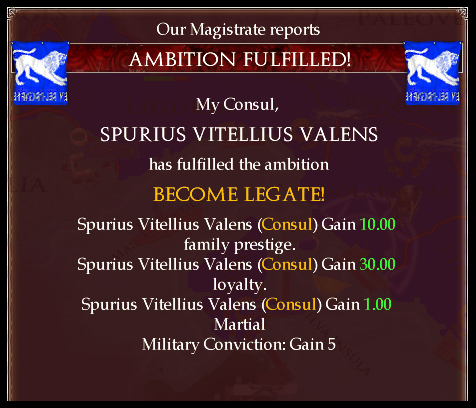
Valens finally gains a military command for Pax Etruria.
With the forces assembled, all that remained was for Consul Valens to select the Republic’s envoy to deliver the official declaration of war to the Carthaginian Senate. Valens had demanded personal choice of the envoy as part of the conditions agreed with his rivals to enable the onset of war. It would be a crucial yet highly dangerous assignment. Carthage had been known to imprison or even execute envoys from foreign states engaged in acts of war. Relations between Carthage and Etruria, in particular, had hit bedrock since the opportunistic Etruscan land-grab of Corsica in the last Punic War. Nevertheless, Martialis and Nasica had agreed to Valens' terms - it seemed natural for the Consul to want some influence over this important aspect of the operation.
Thus was Valens’ second, far more vicious and personal objective revealed. The Consul had long craved revenge on his bitter rival Martialis for obstructing his political ambitions for so many years. As a senior member of the expansionist party, Martialis had lobbied for a series of reckless wars in which Etruscan lives, and that of the state itself, were put into danger time after time. Valens’ retribution was astonishingly cruel, for as envoy he proceeded to select none other than Martialis’s only son, Tiberius Claudius the Younger. Valens cunningly left his second in command, Senator Gracchus, to deliver the announcement of the envoy’s selection only once the fleet had already departed for the open sea. Prefect Martialis was therefore unaware of the events that would enfold until it was too late.
The younger Tiberius Claudius, namesake of his illustrious father, had only recently turned 18 years of age – with no political experience to speak of, he was clearly unsuited to the task. Nevertheless, Tiberius was promptly dispatched to Carthage, carrying a vitriolic and inflammatory dispatch that had been handwritten by Valens himself. When Tiberius - emboldened by the arrogance of youth - announced this message to the Carthaginian Senate, they were incensed both at the cynical opportunism of the Etruscans as well as the grievously insulting prose. Enraged, they ordered their guards to execute Tiberius on the spot.

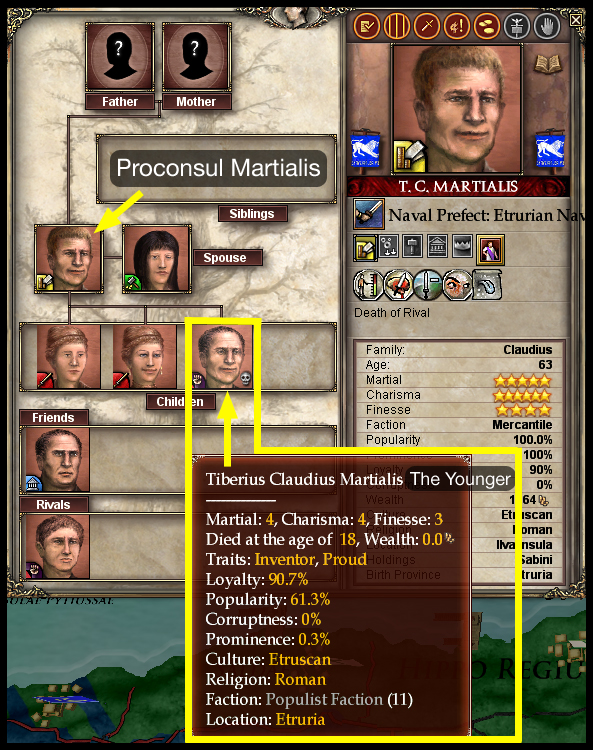
Highlight of the younger Tiberius Claudius shown from the perspective of his father, the Proconsul Martialis.
Martialis’s one and only son was now dead.
-------------------------------------------------------------------------------------------------------------------------------------------------------------------------
OCTOBER & NOVEMBER 279 BC – THE PAX ETRURIA COUP
Martialis was unaware even as Valens and his forces disembarked on Sardinian coast. Valens moved quickly, marching his 5,000 men to the northern city of Olbia and laying it to siege before word reached his adversary back on the fleet.
Martialis himself then discovered the dreadful news some days later. Stricken with anguish, the Prefect confined himself to his quarters, mourning grievously over the loss of his son. Cursing the name of his nemesis Valens, Martialis swore bitter revenge.
But Valens’ schemes ran far deeper than anyone could have predicted. The Consul had made arrangements for an ambitious plot to unfold back on the mainland - one that would enable Pax Etruria to assume total control of the Republic once and for all.
On 27th November, a band of the faction’s supporters arrived at the mainland army’s camp in the dead of night. They brought with them a Consular decree, sealed by Valens himself. Nasica was to be replaced as General with immediate effect by none other than Valens’ second in command, Tiberius Julius Gracchus.

Nasica is ousted as commander of the Auxilia in favour of Senator Gracchus.
Fearing the consequences to his safety once removed from the protective bounds of the Auxilia, Nasica managed to evade the usurpers and fled to Volaterrae, where he would remain in hiding for the foreseeable future. The General had been outwitted and betrayed, blinded by his own ambition into trusting the agreement with Valens that he would enjoy full control over the army while Valens was Consul. Valens was now breaking this promise in spectacular fashion.
But it wasn’t just Nasica’s personal ambitions that had been thwarted. Valens and his Pax Etruria supporters now controlled almost every aspect of the Republic – the Consulate, the Government and the Army. Only the Navy remained independent in the hands of Martialis, who even now was paralysed by grief over the loss of his son. It was a stunning coup and one that had proven utterly effective. Publicly, Valens proclaimed this as a glorious ‘Silent Revolution’ – an overthrow of the Republic’s warmongering elite, which had been achieved without conflict or loss of life amongst the masses.
To ensure no outside intervention to his act of revolution, Valens’ proxies in the Senate House refused to sanction any call to arms of the Republic’s allies. For the time being, Etruria would be facing it’s internal as well as external conflicts alone.

Pax Etruria forces the Senate to block the calling of Etruria's allies to war.
As for Gracchus, his career had now been reignited thanks to his patron, Valens. Gracchus was a capable bureaucrat, having once held the Consulship back in 297-295BC and successfully delaying the First Italian War while he was in office. However, he had been on the political sidelines for over 15 years and more to the point, he had no military experience whatsoever. He would soon be exposed as a woefully indecisive and talentless combat leader.
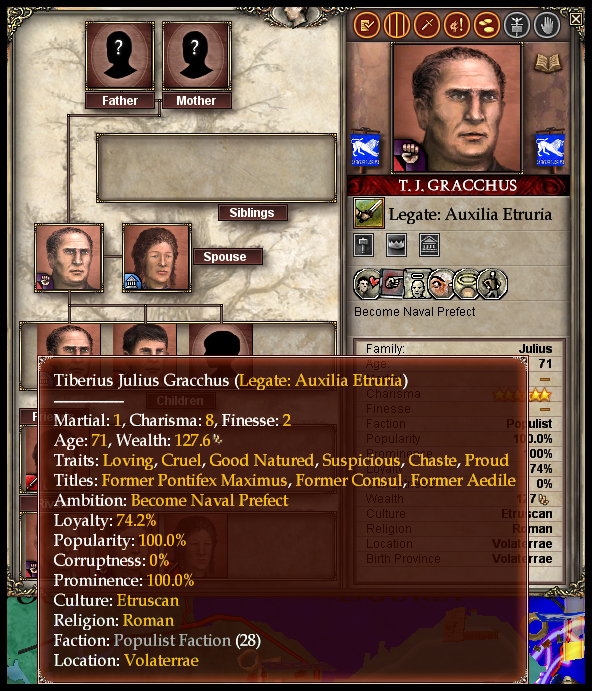
Senator Gracchus finds himself at the helm of the Auxilia Etruria, a command for which he is woefully unqualified.
-------------------------------------------------------------------------------------------------------------------------------------------------------------------------
DECEMBER 279 BC – MARCH 278 BC: CALAMITY AT BONONIA
By December, news of the astonishing Pax Etruria coup finally stirred Prefect Martialis to action. Squadrons of Carthaginian ships were beginning to penetrate Etruscan waters between Corsica and the mainland. Raising anchor, Martialis orders the Navy in pursuit. Deployed in smaller groups, the Carthaginian ships are able to largely outmanoeuvre the Etruscan fleet. Nevertheless, Martialis’s resolve has been hardened by the loss of his son and he doggedly maintains the hunt, picking off enemy ships in a series of running battles.

Martialis engages the Carthaginian navy squadrons...

...while Valens continues to besiege Olbia.
Meanwhile, Carthage’s land forces remain completely occupied with its war on the African mainland. Etruria, too, would shortly face grave domestic problems of it’s own.
In January 278 BC, a new horde of barbarians is spotted crossing the Alps, heading towards Italy. In comparison to previous invasions the barbarian numbers are moderate – 14,000 men of the Quadi tribe. However, with 5,000 men absent with Valens on Sardinia, the Etruscan mainland forces could only muster 9,000 in total.
The Quadi had invaded Italy once before at the tail end of the Great Crisis when, in 302 and 301 BC, they were defeated by the great Mercator Audax. But Mercator was no longer in charge of the defence – leadership now rested with the questionable Senator Gracchus. Early warning signs of his abilities could be seen in the slow and sluggish response to the invasion – the Quadi had already arrived in Bononia and begun raiding Etruscan settlements by the time the Auxilia eventually arrived. The men were in poor order and Gracchus’s deficient leadership skills were sorely exposed when the army finally engaged the Quadi on 20th February. In the calamitous Battle of Bononia the Quadi win a stunning victory, killing almost half the Republic’s troops while only taking a handful of losses themselves. The remnants of the Auxilia fall back to Volaterrae in complete disarray.

Gracchus engages the Quadi...

...but is sorely defeated, taking major casualties.
Arriving at Volaterrae, a dangerous standoff ensues. General Gracchus demands an immediate march back to Bononia, but the army mutinies and refuses to follow him - the rank and file declaring that they would no longer submit to Gracchus. There is but one man who they would follow back into the fray – their former General, Mamercus Ulpius Nasica.
Nasica had been hiding inside the city walls since the Pax Etruria coup back in November the previous year. Sensing the shifting balance of power, Nasica now emerged and presented himself to the army, who rejoiced en-masse at his return. Most of the rank and file had fought under him in numerous campaigns, firstly during his time as second in command to the great Mercator, then as General in his own right. Nasica had no Senatorial precedent or official authority to assume command – technically command still lay with Gracchus and in countermanding him Nasica was committing treason. Nevertheless, the troops rally to his side. Gracchus flees to Tarquinia in disgrace.
-------------------------------------------------------------------------------------------------------------------------------------------------------------------------
APRIL 278 BC – A CONSUL OF ROME
Word of these troubling events reached Valens on 9th April. The Consul had only just negotiated the surrender of Olbia’s garrison – Etruria now held the northern half of Sardinia.

However, Valens was coming to the end of his term in office and his allies had lost control of the army back home. Realising that it would now be dangerous to return to the mainland, he ordered the army south towards Karalis, hoping to buy time while the situation improved on the mainland, while seeking to boost his support with the army by completing the conquest of Sardinia.
At this point, General Nasica was marching north to relieve Bononia. With Martialis also away fighting with the Navy, it meant that all the main players in the Senate House were absent when the new Consular elections had to be held later that month. Senator Gracchus was the only senior figure from either Pax Etruria or Mars Imperito who was present, having recently arrived at the capital following his flight from Volaterrae. However, Gracchus had been disgraced following the disastrous battle with the Quadi earlier in the year and was never realistically going to be considered for the Consulship. He was, however, able to influence proceedings considerably.
Among the Senatorial observers present was Publius Cornelius Dolabella. Dolabella was a powerful yet highly corrupt Roman magnate who had been inducted into the Etruscan Senate following the final surrender of the Roman state, 4 years previously. He wielded a vast personal fortune and held large tracts of land in the city of Rome itself, enjoying great influence over the local Roman aristocracy. He had been Consul as well as a Censor in Rome, back when the city still had it’s independence. Having arrived in Tarquinia to witness the elections, Dolabella was soon approached by Gracchus with an intriguing offer. Gracchus offered to utilise his remaining political influence with Pax Etruria to provide an election platform for Dolabella – in return, the Roman magnate was to align himself with the faction and enact their policies while Consul, as well as working to turn the city of Rome into a new base of support for the faction. Dolabella quickly accepted the offer, eager for the chance to immerse himself further in the political workings of the Republic and for the power he would gain in the process.
Gracchus’s nomination of Dolabella was received in the Senate with outrage and disgust. Only 4 years previously the Republic had been at war with Rome – indeed, Romans had been the mortal enemies of Etruscans for generations. Now Gracchus was proposing installing a Roman as the Etruscan head of state. It was a desperate move by the politically disenfranchised Gracchus. The idea was scandalous to many, but the Senate as a body was proving increasingly ineffectual at managing any kind of actual democratic process. In recent times, several Consular ‘elections’ had been effectively rigged, such as when Mercator installed Nasica or when Octavius installed Valens. Equally troubling was how Senatorial decrees were being ignored – only the previous year Gracchus had been ejected from his lawful position as General, with Nasica replacing him in treasonous circumstances. The Senate was losing control of the workings of the state as well as its leading statesmen, who were embroiled in increasingly bitter feuds. Once again the Senate would prove powerless to intervene as Gracchus and his allies succeeding in installing Dolabella as the Republic’s new Consul.
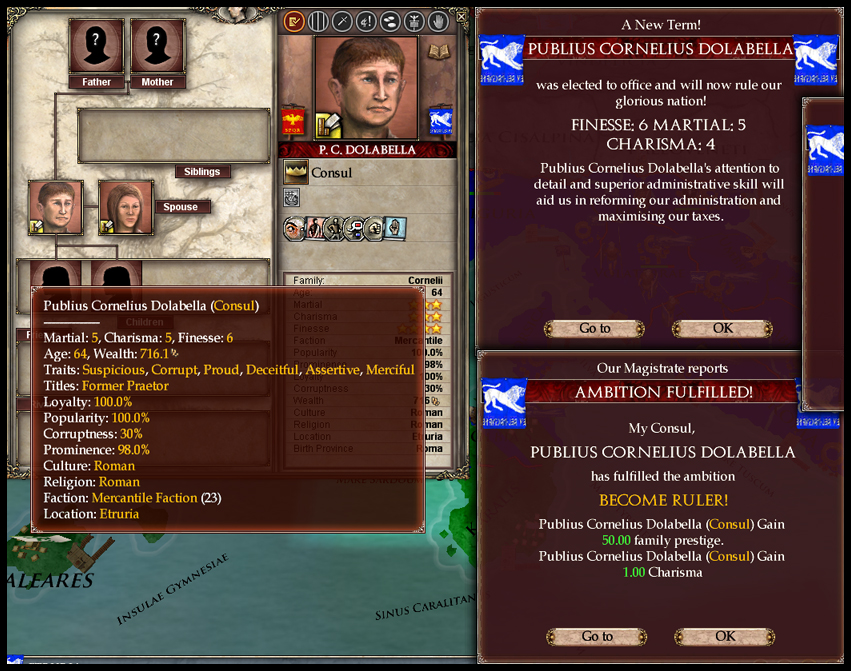
In a scandalous turn of events, the former Roman Senator, Dolabella, is elected Consul of Etruria.
-------------------------------------------------------------------------------------------------------------------------------------------------------------------------
MAY – DECEMBER 278 BC: THE SECOND BATTLE OF BONONIA
Even as Dolabella took the Consul’s chair to a chorus of jeers and whistles, the situation elsewhere was precariously balanced.
The war in Africa was being furiously contested by both sides. For the time being, Carthage could ill afford to spare a single man in the defence of Sardinia. In the west, the Numidians were bearing the brunt of the fighting but had succeeded in pushing back Carthaginian forces to the coast in some areas, capturing several key towns along the way. In the east, the Garamantes had taken advantage of Carthaginian distractions elsewhere and had occupied the small border region of Augemmi, but had otherwise made no significant gains. The citizens of Carthage itself began to grow tired of the prolonged conflict and a minor rebellion had broken out in the city. The war was certainly showing no sign of abating.
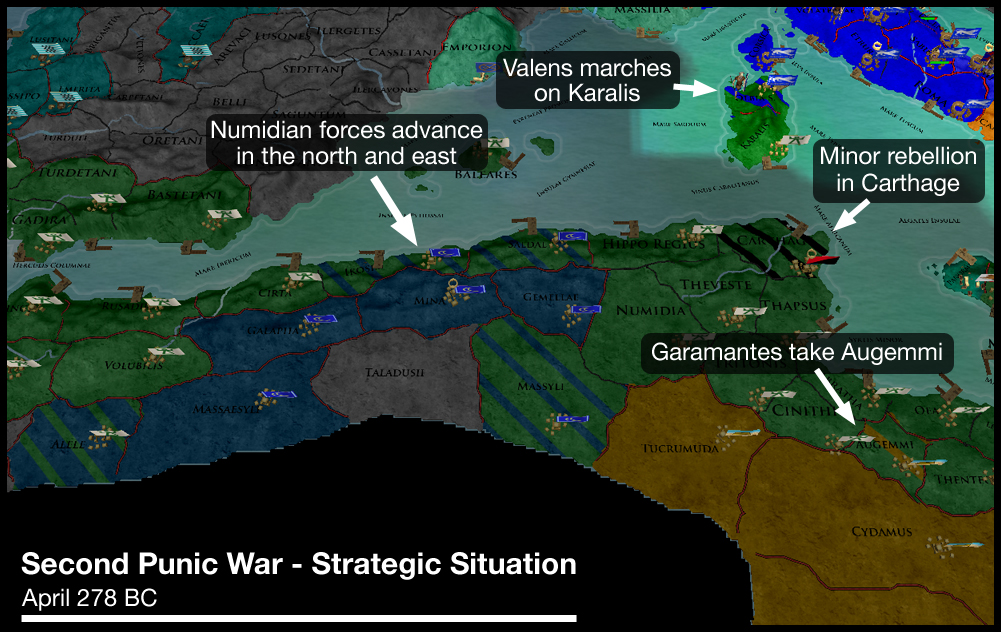
Carthage continues to be distracted by the hotly contested campaign on the African mainland, leaving Valens a free hand in Sardinia.
Meanwhile, back in Etruria, General Nasica and the reassembled Auxilia engaged the Quadi in a Second Battle of Bononia. Under Nasica’s leadership the Auxilia finally drive off the barbarians, who become trapped at the foot of the Alps and are completely destroyed. This proved a huge redemption for Nasica – following his ejection from the army the previous year, he had won back his command (albeit in unlawful circumstances) and re-imposed his authority. The Senate may have been dominated at this point by Pax Etruria, but with the renewed support of the army Nasica was as powerful as any other man in the Republic.

The newly reinstalled General Nasica returns to fight the Quadi once again...

...eventually destroying them entirely.
-------------------------------------------------------------------------------------------------------------------------------------------------------------------------
JANUARY 277 BC – MARCH 276 BC: STALEMATE
Karalis surrenders to Valens’ forces soon in the new year, and the occupation of Sardinia is complete. This could not have come at a better time, for more disturbing news arrives shortly after – the Numidian war effort has collapsed and the Kingdom has meekly surrendered to Carthage, suffering the annexation of most of it’s territory. Carthage remains at war with the Garamantes, but whether they could keep Carthaginian forces distracted within Africa remained to be seen.

Valens takes Karalis while the war continues in Africa...
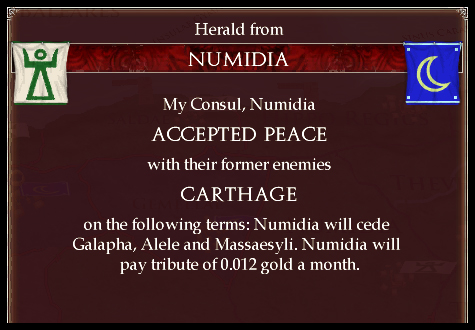
...but Numidia soon capitulates, losing most of it's territory to the victorious Carthaginians.
With Carthage beginning to wrest itself free of its domestic strife, Dolabella (with Gracchus’s approval) finally sends a delegation to Etruria’s allies, the Samnites and the Lucani. Despite their misgivings over the volatile situation evolving within Etruria, the age-old allies respond to the call to arms. Carthage now faced a united Italian front.
With the Italians remaining on the defensive and Sardinia already occupied, the remainder of Dolabella’s term passes uneventfully.
-------------------------------------------------------------------------------------------------------------------------------------------------------------------------
APRIL – AUGUST 276 BC: VALENS’ DOWNFALL
While the stalemate continues in the south, General Nasica remains in the north, pacifying the region following the recent Quadi raids. Meanwhile, Martialis patrols the seas against Carthaginian naval attacks.
Pax Etruria remains in nominal control of the Senate House. Senator Gracchus, who has been pulling the strings in Valens’ absence, arranges for his political ally Sextus Fulvius Valens to take over from Dolabella as Consul at the end of his term. Dolabella returns to Rome to solidify backing for Pax Etruria within the city. This would be Sextus’s second term in office, having previously held the Consulate from 289 BC.

Sextus gains a second term as Consul, albeit as an essentially unelected one installed by Gracchus.
With control of the Senate House secured, Nasica away in the north, and with messages of support beginning to emerge from within the Roman aristocracy, Proconsul Valens now felt confident enough to return from his Sardinian expedition and address the situation on the mainland. Leaving a loyal garrison behind to control Karalis, he endeavours to make an overnight crossing to Tarquinia, intending to link up with Gracchus and Sextus.
This would prove to be a fatal mistake. Valens had underestimated Martialis’s control of the seas and on the night of August 25th his transport vessel is intercepted and seized by one of the navy’s patrols. The rancorous Martialis orders Valens brought aboard his flagship in chains. On the following morning, Martialis levels charges against his adversary – exploiting his position as former Consul, treason against the state and plotting to overthrow the government. Most bitterly of all, he held him responsible for the death of his son, Tiberius the Younger, back in 279 BC. The charges are legally tenuous since Valens had essentially been acting in his legally appointed position as Consul throughout, albeit recklessly. But the feud between the two rivals was beyond reckoning and no man could withhold Martialis from gaining vengeance for his son.
Valens was summarily found guilty of all charges. The judgment was death. Thus, on the morning of 26th August 276 BC, the former Consul Valens was crucified on the deck of the flagship for all to see. It was a gruesome and miserable end.

Martialis finally has his nemesis in his grasp.
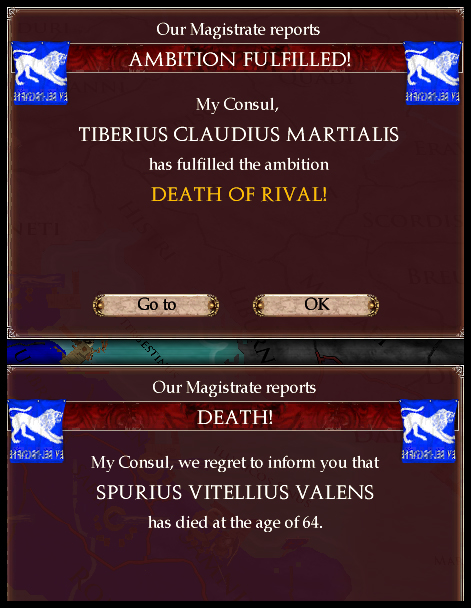
The Prefect gains the ultimate revenge for the murder of his son, Tiberius the Younger.
-------------------------------------------------------------------------------------------------------------------------------------------------------------------------
Spurius Vitellius Valens had been one of the Republic’s principal leaders throughout its recent history. He was the incumbent Consul when Etruria was dragged into the Second Samnite War [see Chapter 1] and went on to gain two more Consulships over the course of his long and illustrious career. This was an unprecedented feat – no other Senator had ascended the Consulship three times.
Valens’ political influence was rooted in his populist appeal. Throughout his career he had striven for what he believed to be the best and safest outcome for Etruria’s citizens – namely, aversion to risky foreign wars and an emphasis on peace and a more manageable colonial expansion. In the face of an increasingly powerful new generation of warmongering Etruscan politicians, Valens had founded the insular and conservative faction, Pax Etruria, for which he had provided strong leadership for many long decades. As the Etruscan Senate became volatile and fragmented in more recent years, his political and personal rivalry with the senior Mars Imperito Senator Martialis had flared out of control. This resulted in the effective murder of Martialis’ son and, ultimately, that of Valens himself following the failure of his audacious but ultimately doomed Silent Revolution of 279 BC.
News of Valens’ grizzly demise at the hands of Martialis sent shockwaves across the Republic. Martialis may have had insurmountable moral grievances over his rival but he had little or no legal grounds for ordering his execution. It was yet another essentially treasonous act from a leading Mars Imperito supporter, following Nasica’s army coup the previous year. This was an unprecedented scandal - one that would prove to be the final nail in the coffin as far as Senatorial authority was concerned.
Back on the mainland, the remaining members of Pax Etruria agonized over the downfall of their situation, as well as their remaining options. Valens’ demise meant that leadership of the faction nominally passed to the old and wily Senator Gracchus, supported by the likes of former General Octavius and the Roman Senator Dolabella, as well as the incumbent Consul, Sextus. Together their situation now looked grim. They had lost control of the northern provinces, where General Nasica had re-asserted his leadership over the army. Meanwhile, any possible help from Valens’ forces had been extinguished by Martialis, who controlled the coastal seas with an iron fist. The one silver lining was that they still controlled the government in Tarquinia, as well as having significant authority in Rome thanks to Dolabella’s influence there.
With the situation at home looking increasingly dangerous, Consul Sextus soon negotiated a soft peace with Carthage in order to focus on his own political survival, and that of Pax Etruria as a whole. As part of the settlement, Carthage agreed to cede the city of Karalis – the southern half of Sardinia – to Etruria. Olbia was to be returned to Carthaginian control, much to the chagrin of the Mars Imperito leadership.
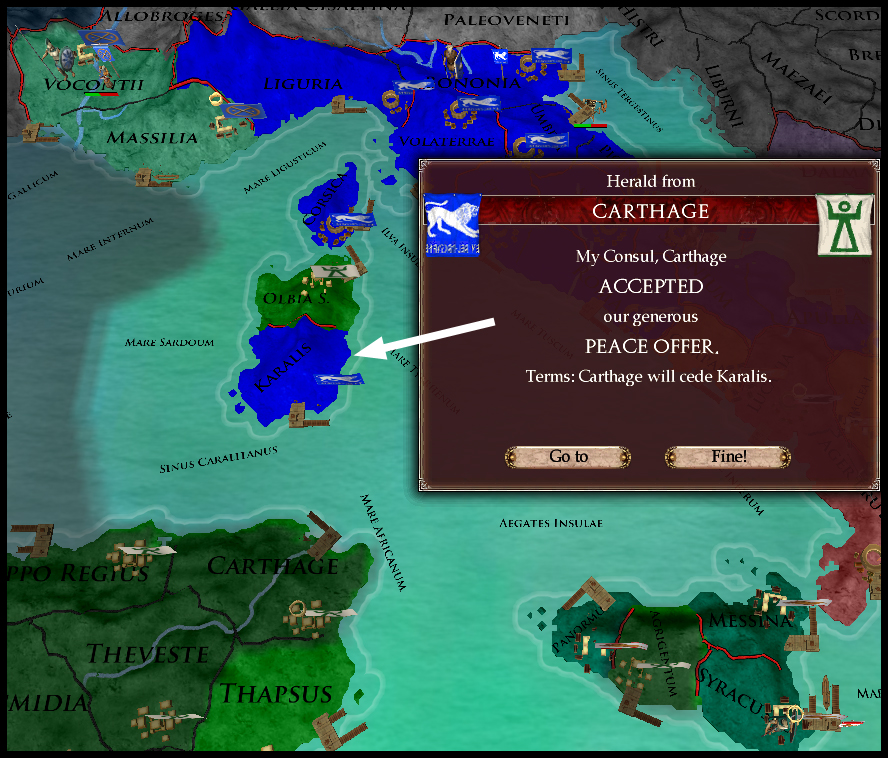
The Second Punic War was over.
-------------------------------------------------------------------------------------------------------------------------------------------------------------------------
SUMMARY – SEPTEMBER 276 BC
The Second Punic War had lasted 3 years – approximately the same duration as the First Punic War that had been fought around a decade earlier. The Second War, however, had been fought under completely different circumstances to its predecessor.
Whereas the First Punic War had been an epic Mediterranean-wide campaign dominated by Greek forces, the Second War was a much smaller conflict orientated around the island of Sardinia only. Etruscan troops had the run of the island from the outset – Carthage’s main focus was on its domestic struggles with Numidia and Garamantes and it had been totally unable to reinforce the island garrison, which was quickly overrun. The fledging Etruscan Navy had proven it’s worth however, defeating an array of Carthaginian flotillas in several skirmishes and gaining total control of the local sea-lanes.
The Republic of Etruria had come out of the war having annexed the southern half of Sardinia. This was a relatively poor showing for 3 years of occupation, particularly considering Carthage’s domestic troubles. However, once again, Etruria had been held back by it’s own internal conflicts. Alarmingly, these had now spilled over into full-on violence and disorder, culminating in the failed Silent Revolution and the murder of Proconsul Valens. Etruria might have emerged victorious from the war but it now seemed to be entering its darkest chapter yet.
Carthage, meanwhile, had seemingly vanquished the Numidians and now controlled most of their former territory in Africa. Their struggle with the Garamantes would continue for years, but the territory gained from Numidia would vastly outweigh that lost to the Republic of Etruria, so for the time being they had come out of their myriad conflicts ahead of par.
For the next 18 months the situation in Italy would prove to be tenuously stable. The southern Italian states remained at peace – Magna Graecia’s civil war had since come to a conclusion and the Lucani and Samnites otherwise remained docile. Massilia was the one notable exception. The western Greek Republic had once again suffered a torrent of barbarian invasions, beginning in early 276 BC, which pushed back the Massilian army and overran Vocontii. Frustration at the hapless government boiled over and later in the year the local governor of Emporion, one Aristophanes, would declare himself Tyrant, sparking a civil war.


Back in Etruria, a tense standoff ensued between the legitimate Pax Etruria government in the south, headed by Consul Sextus, and the circling vultures of General Nasica in the north and Prefect Martialis in the west. Nasica was pinned down in Liguria, fighting off the same barbarian raiders who had rampaged through Vocontii earlier in the year. With Nasica preoccupied on the frontier while Sextus, Gracchus and their allies loitered in the capital, an ominous calm descended over the Republic for the remainder of 276 BC and the whole of 275 BC.
But by the start of 274 BC, Sextus’s legal term as Consul was drawing to a close. The final climactic battle for the future of Etruscan leadership was about to begin.
Last edited:
These last uodates have been great! :Keep it up!
So great to see the rise and fall of our Etrurian Republic.
(...and what of its renewed rise to power after these troubles...?)
So great to see the rise and fall of our Etrurian Republic.
(...and what of its renewed rise to power after these troubles...?)
These last uodates have been great! :Keep it up!
So great to see the rise and fall of our Etrurian Republic.
(...and what of its renewed rise to power after these troubles...?)
Thanks! Really glad you're enjoying it
Unfortunately there are far worse troubles to come for Etruria in the next chapter...will try to upload shortly!
Chapter 10
The Die is Cast
The Die is Cast
Liguria, April 274 BC.
In a decisive battle, General Nasica destroys the combined barbarian hordes of the Varduli and Orgonomesci. The barbarians had looted Vocontii the previous year and were weighed down with much plunder – this was coolly seized by the triumphant General, along with many captives who were led off into slavery.

General Nasica wins great spoils from his victory over the Orgonomesci and Varduli - the loot having been taken from their previous raids in Massilia.
Nasica was in an envious position following his victory. He had amassed a sizable fortune and had solidified his control over the army. Over half the troops – 13,000 men – had by now sworn personal oaths of loyalty directly to him, following years of successful and relentless campaigning. Furthermore, the General had not been idle during the deceptive calm of 276 and 275 BC. He had arranged for Valens’ former Sardinian invasion force of 5,000 men to be shipped to the north and placed under his own command. To this he added a new and formidable cavalry wing of 4,000 horses – 2,000 Etruscan noble cavalry supported by 2,000 lighter horse archers trained in the Sarmatian style. This brought the total of the army up to a considerable 22,000 men. This was still a lesser figure compared to some of the heavily militarised Greek and Italian states but nevertheless consisted of crack troops – well drilled heavy infantry, archers and cavalry – that would be more than a match for the more numerous but poorly disciplined militias elsewhere. Nasica renamed this new combined force the Legio Etruria.

Nasica enjoys huge support from within the ranks of the newly reorganised Legio Etruria - 22,000 men in total.
Around this time Nasica also inducted his eldest son, also named Mamercus Ulpius Nasica, as an officer in the newly reorganised legions. Mamercus the Younger, more commonly known as Ulpius Cordus to distinguish him from his father, was young man of only 19 but had confidence beyond his years, carrying his father’s same pride and assertiveness.

Ulpius Cordus - the eldest son of the General Nasica.
With victory secured over the barbarians, Nasica had consolidated his hold over the northern provinces and was now ready to make his next move. His recent expansion of the army was just one of a number of troubling signs of his ever deepening lust for power. Since the death of his former patron Mercator Audax six years prior, Nasica’s ambitions had been increasingly unleashed within the confines of an already fractured Republican Senate. During that time he had forced the state to war with Carthage, ousted the legally appointed General of the army (Gracchus) and, having seized command, had subsequently been operating in the north effectively outside of Senatorial control. He was all but an outlaw, albeit one with a powerful army at his back. His escalating ruthlessness and determination had only been kept in check by the barbarian influx from Massilia. Now, with winter turning to spring and new Consular elections on the horizon, the powerful and ambitious General decided to act.
Nasica assembled his troops and prepared to make a great speech. The Republic, he announced, had reached a critical juncture in its history. The Silent Revolution of 279 BC had demonstrated the instability and dangers posed by a Pax Etruria led government: this was a message keenly understood by the rank and file, who had lost countless numbers of their comrades in the catastrophic First Battle of Bononia under Pax Etruria leadership. Nasica went on to declare that with the capital and the Senate House presently dominated by Gracchus and his cronies, it was inevitable that the upcoming elections would once again be rigged in Pax Etruria’s favour.
"But who might save the Republic from this mortal peril? Only we men," announced Nasica, "could possibly intervene. Together we must rally to the Senate House and sweep out Gracchus and his coterie of spineless bureaucrats, ensuring that a new government may emerge, a strong government, a Mars Imperito government; one that would honour it’s soldiers, protect it’s borders and marches in force against it’s enemies to extend new horizons of Etruscan glory!".
With an almighty cheer, the legions signalled their support for the revered General. Orders were given to muster in readiness for an immediate departure.
Thus, on 11th April 274 BC, Senator Gracchus and his allies in the capital received the terrible and alarming news. General Nasica had declared Gracchus and the other Pax Etruria leaders to be enemies of the State and had ordered their immediate arrest. Worst of all, he was marching south at the head of his army.
-------------------------------------------------------------------------------------------------------------------------------------------------------------------------
Gracchus, much to his credit, reacted assertively to the news and moved to quell the panic that had quickly arisen in the Senate House.
The situation for Pax Etruria was bleak but not entirely without strength. The faction yet controlled the capital at Tarquinia and it’s Senate House, as well as having a strong power base in the city of Rome further south. They also retained significant influence over the island of Corsica and Sardinia – the wily old Gracchus had recently installed his eldest son Julius the Younger as regional Dux over the islands, while they still had the sympathetic garrison at Karalis that had been set up by Valens prior to his demise 2 years earlier. Stationed at Corsica alongside Julius the Younger was former General Octavius, providing valuable strategic council to the governor. Furthermore, Nasica was not the only one who had been arming throughout 276 and 275 BC. Gracchus had been quietly making his own preparations, arranging for a new militia to be recruited and equipped in Rome.

Julius the Younger - son of the Pax Etruria figurehead, Senator Gracchus.
But Nasica’s outrageous circumvention of procedure had allowed him to steal the initiative from his enemies. The General carried out a lightning march south and arrived with the legions at the walls of Tarquinia before Gracchus had time to prepare for a suitable defence. Gracchus and his companions were consequently forced to flee south to Rome just days before Nasica’s arrival. The remaining Senators, fearful of reprisals, ordered the gates of the city to be thrown open, allowing Nasica to quickly take control of the capital.
Meanwhile, Gracchus and those Senators loyal to him arrived in Rome and established themselves in the Roman Forum, welcomed in open arms by the local aristocracy. An assembly of Senators was quickly summoned, where Gracchus announced the terrible news that General Nasica had initiated a coup against the legitimate Pax Etruria government. Gripped by a climate of fear and uncertainty, the council’s Senators moved to take extreme measures. It was henceforth declared that Gracchus was to be imbued with extraordinary powers as Dictator of the Republic until the crisis was overcome.
This was an extreme and unprecedented event. Nasica himself had proposed Dictator powers be implemented once before, for his patron Mercator Audax during the darkest times of the Great Crisis. But even in those perilous circumstances the proposal had been refuted by the Senate. The fact that such a motion had now been passed was itself a sign of the enormous calamity that had befallen the Republic. By these desperate measures, the Pax Etruria remnants in Rome hoped to unite under one singular authority in resisting the onslaught of Nasica and the Legions. Gracchus, the newly declared Dictator of the Republic, summoned the militias of Rome to arms and prepared for open conflict.
Catastrophe had finally struck - for the first time in its history, the Republic was gripped in the flames of civil war.

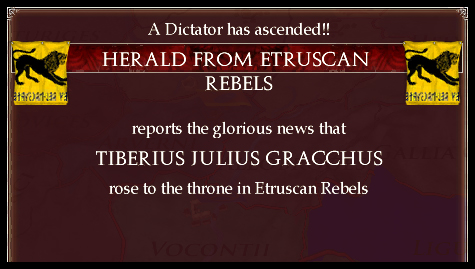
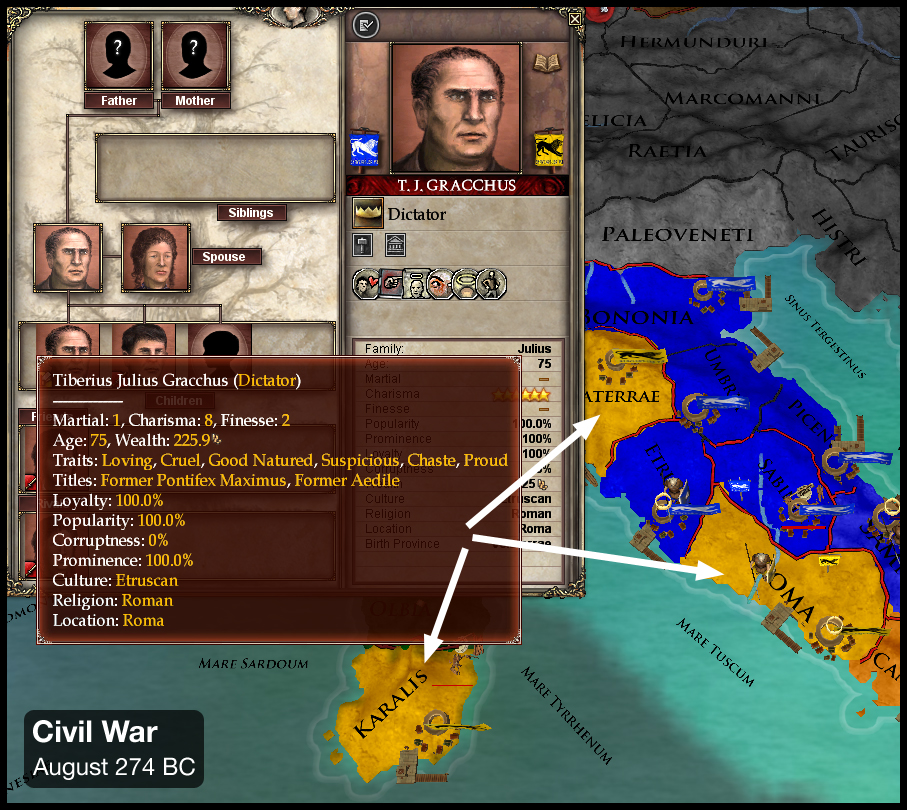
Gracchus becomes the Dictator of the Pax Etruria led government of Etruria - now at war with that of his enemy, Nasica.
-------------------------------------------------------------------------------------------------------------------------------------------------------------------------
In the days that followed, cities and provinces would declare for one side or the other. Gracchus’s native city of Volaterrae declared itself for his cause, along with Corsica and Sardinia under the leadership of Gracchus’s son, Julius the Younger. The majority of the State, however, would declare for General Nasica, who already had the support of the northern provinces following his successful campaigns against barbarians in those parts, as well as the support of the remaining southern provinces such as Umbria, Picenum and Sabini.
Outnumbered and largely surrounded, the strategic situation for Pax Etruria looked grim indeed. Nasica’s swift march south had denied Gracchus the time he’d needed to prepare for the conflict – consequently, the newly anointed Dictator had only 5,000 men under arms at the onset of the civil war. The situation was made worse still when the garrison of Corsica, disillusioned at the odds stacked against them, proceeded to arrest Julius the Younger and declare their loyalty to Nasica’s government. Claudius was handed over to Nasica as a symbol of their allegiance – Octavius somehow managed to escape and made his way to Rome to join the elder Gracchus there. Octavius carried news of the dire events on Corsica to the Dictator - not only was his son now held captive by Nasica; he also now held only 3 provinces to Nasica’s 7. The momentum was already turning further in Nasica’s favour.

Corsica soon declared for Nasica - Julius the Younger was handed over to be imprisoned by the General.
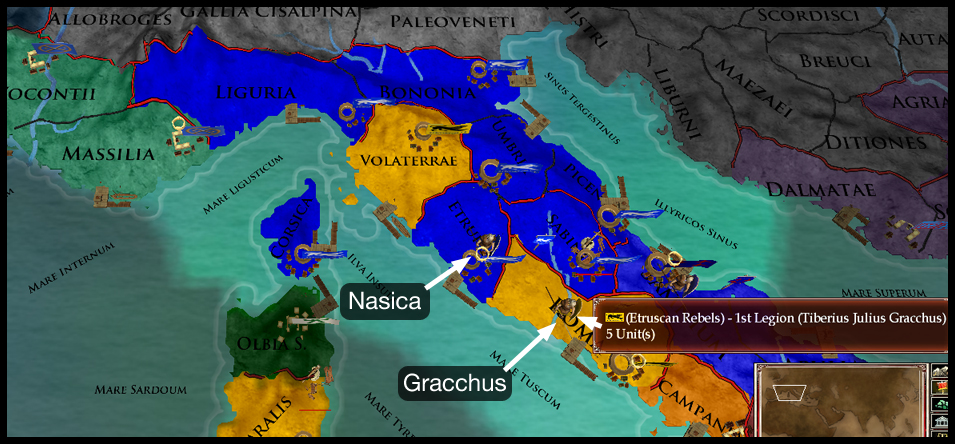
With Corsica lost, the strategic balance was already slipping away from Julius's father, the Dictator Gracchus.
By this time, word had reached Prefect Martialis of the shocking developments back on the mainland. The former Consul had been leading the fleet in exercises off the Etruscan coast. Hearing of the troubling events on the mainland, he immediately set course for Tarquinia, arriving at the capital shortly after Nasica’s takeover of the Senate House. The Prefect had come to demand answers – it was at this moment that the depths of Nasica’s ruthlessness were finally exposed.
Nasica had learned a great deal from the career of his patron, the great Mercator Audax. He had no wish to follow in the same footsteps, to become a tired old man half filled with the limited glories offered by the Republic and tormented by dreams of what might have been. Unlike Mercator, Nasica already had a son come of age – the able Ulpius Cordus. With Tarquinia in his grasp and the army behind him, the scheming General soon turned his minds eye towards dreams of founding a great dynasty, one that would rule Etruria for generations to come.
Martialis, that great statesmen and time honoured servant of the Republic, was the only man powerful enough to stand in Nasica’s way. Martialis had been a comrade of Nasica's for many years, standing side by side as stalwarts of Mars Imperito. But Nasica's lust for power overcame all sense of personal loyalty. So it was that on the morning of 9th August, Martialis was arrested by Nasica’s troops on the very steps of the Senate House. Without even a word of clemency to his old ally, Nasica ordered Martialis to be executed on the spot. The proud old figurehead of Mars Imperito was cruelly set upon with sword and spear and brutally hacked to death within earshot of the astonished Senators inside.
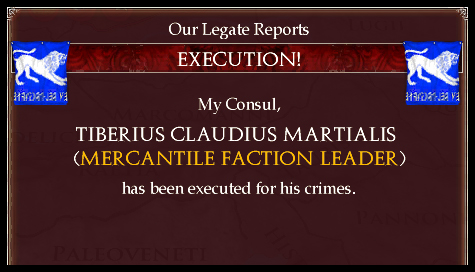

Tiberius Claudius Martialis - one of the greatest figures in recent Etruscan history - is murdered in cold blood by the rampant General Nasica.
-------------------------------------------------------------------------------------------------------------------------------------------------------------------------
Tiberius Claudius Martialis was one of the true greats of Etruscan recent history. His stalwart leadership had heavily influenced the course of the Republic’s policies and growth over the past 30 years. Under his shrewd guidance Etruria had recovered it’s battered economy in the aftermath of the Great Crisis, forged alliances with the Greek world that had allowed the Republic to expand it’s borders to the south and west, not to mention his steadfast leadership of the Republic’s navy throughout the First and Second Punic Wars. His only son, Tiberius the Younger, had been cruelly murdered at the behest of his old nemesis, the Proconsul Valens, only for Martialis to gain his revenge when he captured Valens and crucified him on the deck of his flagship. But it would be his closest ally that would prove to be his undoing. He could never have expected such callous and brutal scheming even from one as ambitious as Nasica. By the time Nasica’s ruthlessness had been revealed, it was already too late. The House of Martialis had been completely eliminated.
This macabre turn of events left only a handful of statesmen still alive from a generation of great Etruscan men that had once graced the Senate House, including the likes of Mercator Audax, Valens and Vitellius. The doors were now laid open for Nasica who eagerly moved to fill the power vacuum. Martialis’s blood had barely touched the steps of the Senate House before Nasica announced his first motion since returning to the capital. The General declared that the Republic needed to evolve if it was to survive. The Consular system had proven to be a failure in recent times, overcome by corruption and in-fighting. The Republic must follow a singular strong leader if it was to survive the civil war and subsequently prosper on the world stage. Fire must be met with fire – where Gracchus had been declared Dictator, so in turn must Nasica himself if he was to gain the authority necessary to overcome the crisis.
With the guards standing by, still stained with the blood of Martialis, there was not a man amongst the terrified Senators who would dare oppose the motion.
Thus, on the afternoon of 9th August 274 BC, Mamercus Ulpius Nasica was unilaterally declared Dictator of the Etruscans after Martialis had only that morning been murdered. The age of democracy in Etruria was over.

-------------------------------------------------------------------------------------------------------------------------------------------------------------------------
There were now two opposing Dictators of Etruria, but only one could possibly survive.
Nasica’s own tyranny continued as it started – bathed in blood and intrigue. Mere days after his rise to the Dictatorship, Julius Gracchus the Younger died in prison in suspicious circumstances – many assumed it was on the orders of Nasica himself. Julius’s death preceded a reign of terror throughout the capital. Riots quickly spread at the news of Martialis’s death and Nasica’s subversion of democracy, only to be brutally put down by the legions. A wave of summary executions unfolded upon anyone in the aristocracy who was suspected of disloyalty. Blood flowed through the streets for many days. When it was over and Nasica finally felt there were no viable opposition left, he gathered the legions and prepared to march south to Rome.

Gracchus's son dies under suspicious circumstances in Nasica's dungeons.
Gracchus, meanwhile, descended into a rage upon hearing of the death of his son. A madness came over him; swearing revenge, he refused to give up command of his meagre forces to the far more experienced and capable General Octavius. Nasica’s powerful legions arrive on 5th September and destroy Gracchus’s forces outside the city walls. Gracchus and a handful of his retainers manage to escape into the city before it is encircled by Nasica’s forces.
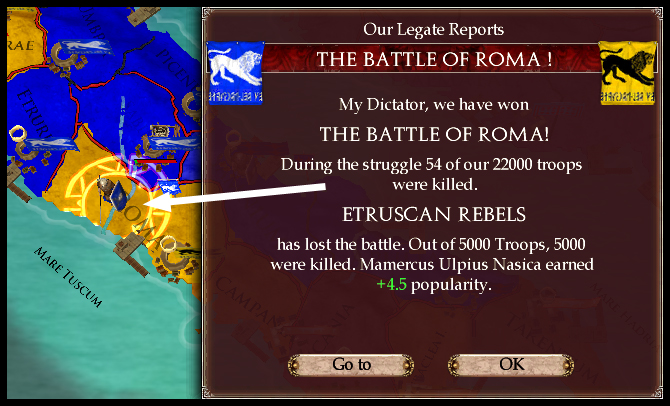
Gracchus's milita is destroyed and Rome is quickly laid to siege.
However, with Rome now under siege and Gracchus’s only field army now destroyed, the civil war appeared to be over before it had begun. With all hope seeming lost, the elderly Gracchus finally succumbs to the grief over his son and his own spectacular fall from power, passing away on 12th December at the age of 75.

Tiberius Julius Gracchus, the last significant leader of Pax Etruria, lies dead.
The remnants of Pax Etruria are now a disorganised anarchy with no clear leader. Rome promptly surrenders to the sole remaning Dictator Nasica, who then marches north to subdue Volaterrae. At this point the Dictator splits his army, placing 7,000 men under the command of his son Ulpius Cordus with orders to cross to Sardinia and retake Karalis.

Rome surrenders to Nasica following the death of Gracchus.
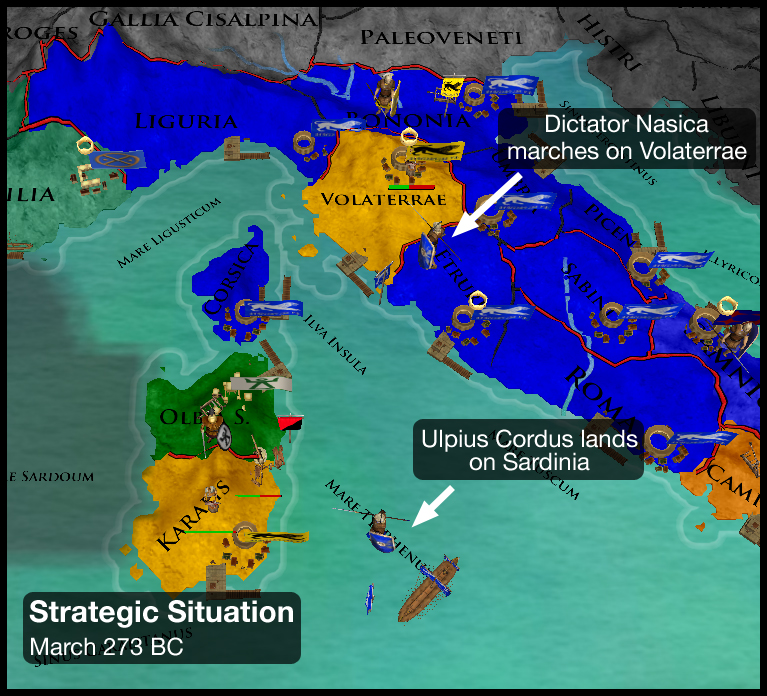
By March, Nasica marches north to retake Volatterae while his son Ulpius Cordus lands on Sardinia to take Karalis and end the war.
With Volaterrae besieged by his father, the young Cordus commands a textbook assault on Karalis, landing successfully and forcing an early surrender from the beleaguered garrison. Albeit a short campaign, the action gains Cordus the confidence of the troops who quickly take to the assertive son of their hero Nasica.

Ulpius Cordus quickly subdues Karalis...

...winning the respect and admiration of the troops.
Finally, on 4th October 273 BC, Volaterrae surrenders to the elder Nasica’s forces and the civil war is over. Dictator Nasica now rules over the whole of Etruria.

The civil war is finally over.
-------------------------------------------------------------------------------------------------------------------------------------------------------------------------
SUMMARY – OCTOBER 273 BC
The road to civil war had begun decades before it finally erupted. The seeds had been sown during the Great Crisis, resulting in a conflict that profoundly intensified in later years.
In some ways the conflict was inevitable. The Republican system of government had failed to control the ambition of the state’s leading figures in recent years, several of whom had flagrantly violated Senatorial authority to take matters in their own hands. For the time being, a strong government had emerged under the singular leadership of the state’s leading General, Marcus Ulpius Nasica. The Dictator’s position was strengthened further by the emergence of his son, Ulpius Cordus, onto the public stage. Already at the tender age of 19, Cordus had gained the respect of the army and looked to be a force to be reckoned with in years to come.
The road to the Dictatorship had not been without significant bloodshed. Entire lines of the state’s most prominent families had been systematically wiped out – Valens and Mercator both died without leaving any male heirs, while Martialis and Gracchus both died after watching their respective sons perish before them. One surviving connection to the past was young Decimus Vitellius Vitalis, son of the esteemed ProConsul Tertius Vitellius Vitalis, who had tragically died of plague back during the Second Punic War. Decimus had grown into a confident and capable tactician, who had remained loyal to Nasica throughout the civil war and was henceforth rewarded with command of the Navy.

Decimus - the son of former Consul Vitellius - becomes the new Prefect of the Navy.
A further wave of executions were carried out by the victorious Dictator following his victory, casting a long dark shadow of tyranny and despair over the terrified populace. Amongst the only former enemy to be spared was Quintus Ignatius Octavius, who was released by the Dictator to live out his life as an ordinary citizen.
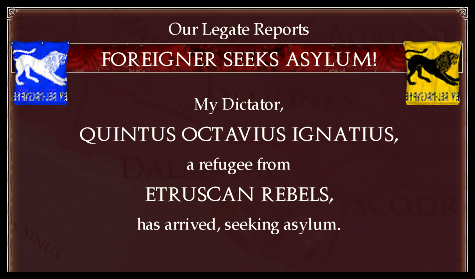
Octavius's life is spared by Nasica.
The age of the Dictatorship had befallen Etruria. It’s immediate future was now in the hands of one man alone – Mamercus Ulpius Nasica.
Last edited:
After all of this commotion, one wonders where such a stream of blood leads...
Magnificent.
Magnificent.
:clap: Such an exciting climax to the rot taken place in the Senate. Also, I'm not sure if I'm reading too much into this or not but
does this mean you had become a military republic before you had proclaimed the dictatorship?Nasica assembled his troops and prepared to make a great speech. The Republic, he announced, had reached a critical juncture in its history. The Silent Revolution of 279 BC had demonstrated the instability and dangers posed by a Pax Etruria led government: this was a message keenly understood by the rank and file, who had lost countless numbers of their comrades in the catastrophic First Battle of Bononia under Pax Etruria leadership. Nasica went on to declare that with the capital and the Senate House presently dominated by Gracchus and his cronies, it was inevitable that the upcoming elections would once again be rigged in Pax Etruria’s favour.
"But who might save the Republic from this mortal peril? Only we men," announced Nasica, "could possibly intervene. Together we must rally to the Senate House and sweep out Gracchus and his coterie of spineless bureaucrats, ensuring that a new government may emerge, a strong government, a Mars Imperito government; one that would honour it’s soldiers, protect it’s borders and marches in force against it’s enemies to extend new horizons of Etruscan glory!".
Just started reading this today and boy am I glad I missed that 4 year gap. Brilliant writing by the way
Thanks guys! I really appreciate the feedback 
I can see why you might think that, but no, there weren’t any changes in the government before the Dictatorship set in. Gracchus’s 'rebellion' started immediately as a Dictatorship. Nasica’s ‘loyalist’ faction, of which I retained control as the player, converted soon after that (once the tyranny rating had risen high enough - which wasn’t hard considering all the inprisonments and executions!).
As I’m role-playing my way through the game, the Dictatorship felt like the appropriate path to take for someone like Nasica. It was actually Gracchus’s example that gave me the idea - it didn’t seem hard to believe that an ambitious leading General would use the threat of a breakaway Dictatorship as the excuse to launch his own similar grab for power. A bit like the Reichstag fire in that sense.
In fairness, the Republic wasn’t helping things at all from a player’s point of view. I’ve dramatised the Senate’s internal conflicts in the narrative but as always this was based on actual game events - for example, I’d have personally preferred to continue the alliance with Massilia but the game had other ideas! It was getting increasingly hard to pass any kind of diplomatic solution - the Senate just couldn't agree and kept voting everything down.
The downside to all this is that the state has been left in a pretty shocking mess! I’ll quote some stats in the next chapter but needless to say tyranny is through the roof, manpower is at an all-time low etc etc. Nasica might have gained the Dictatorship but it remains to be seen whether he can hold on to it!
Also, I'm not sure if I'm reading too much into this or not but does this mean you had become a military republic before you had proclaimed the dictatorship?
I can see why you might think that, but no, there weren’t any changes in the government before the Dictatorship set in. Gracchus’s 'rebellion' started immediately as a Dictatorship. Nasica’s ‘loyalist’ faction, of which I retained control as the player, converted soon after that (once the tyranny rating had risen high enough - which wasn’t hard considering all the inprisonments and executions!).
As I’m role-playing my way through the game, the Dictatorship felt like the appropriate path to take for someone like Nasica. It was actually Gracchus’s example that gave me the idea - it didn’t seem hard to believe that an ambitious leading General would use the threat of a breakaway Dictatorship as the excuse to launch his own similar grab for power. A bit like the Reichstag fire in that sense.
In fairness, the Republic wasn’t helping things at all from a player’s point of view. I’ve dramatised the Senate’s internal conflicts in the narrative but as always this was based on actual game events - for example, I’d have personally preferred to continue the alliance with Massilia but the game had other ideas! It was getting increasingly hard to pass any kind of diplomatic solution - the Senate just couldn't agree and kept voting everything down.
The downside to all this is that the state has been left in a pretty shocking mess! I’ll quote some stats in the next chapter but needless to say tyranny is through the roof, manpower is at an all-time low etc etc. Nasica might have gained the Dictatorship but it remains to be seen whether he can hold on to it!
Back in 302...
Where have I heard this before...?
A charismatic and eloquent orator, Nasica leads the opposing group of Senators in arguing for the Republic’s full support of the Consul who, he argues, can yet lead Etruria to victory in these dark times. In direct opposition to Valens and Gracchus, Nasica calls for emergency powers to be placed upon the Consul and for him to be declared Dictator of the Republic. Such extraordinary measures had never before been undertaken in Etruscan history, and the fierce debate continued to rage as the Senate sought agreement upon a decision.
Where have I heard this before...?

